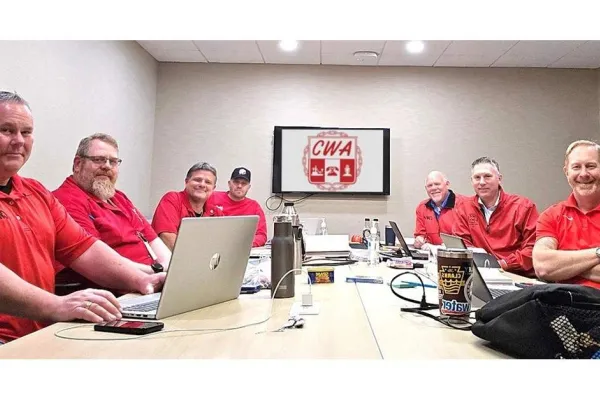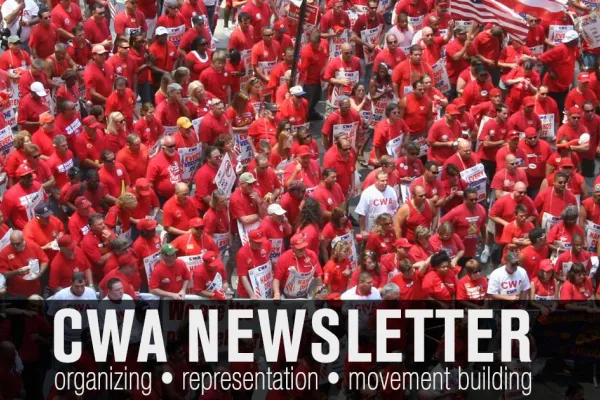Press Release: This Labor Day, Verizon Strike Has Bigger Lessons for U.S. Economy
Contact: Candice Johnson, CWA Communications, 202-434-1168, [email protected]
By CWA President Larry Cohen
Labor Day. Any more, it’s one last weekend at the beach, and getting the kids back to school.
But for American working families, this Labor Day brings a continued free fall from the middle class standard of living that American workers once enjoyed.
It doesn’t have to be this way. But it will take a massive political movement, with real focus from labor and our partners, to create the political will of our elected leaders to restore real bargaining rights for workers. Bargaining rights in turn can help restore effective consumer demand and bring about an economic recovery that benefits all, not just the wealthy.
Recently, 45,000 CWA and IBEW members were out on strike for 16 days, the largest strike in the U.S. in years. For our members, the strike was as much about real collective bargaining rights as much as about keeping our standard of living for our families.
For our members and their union, as well as Verizon management, there is no larger story. Verizon has begun a management transition, and we are hopeful that for lots of reasons this is an opportunity for change.
Cuts in wages, benefits, and jobs have become the new normal; yet resistance on the scale that Verizon workers showed is nearly unthinkable in the United States of the 21st century.
Look at nearly every other industrial democracy, where quality and cost effective health care is the norm, retirement security means much higher income replacement, public policy supports retaining jobs in key industries and most important, there is widespread public and political support for collective bargaining. It’s long past time that when we make global comparisons in a global economy we measure where the US stands in terms of work place rights and the direction of our standard of living.
We are in an economic free fall. Tax cuts will not fix it; they will make deficits worse and put more pressure on public services. Attacks on working Americans and their rights like those led by extremist members of Congress and governors at every opportunity won’t fix it; they will only make the landing even harder.
We need to restore workers’ rights so that we all can negotiate and engage our employers in a meaningful way. Collective bargaining is how we will fire up demand, so that workers can improve their conditions and thus improve the economy. We will never have an economic recovery in this country if very profitable employers automatically cut wages, cut benefits and ship more good jobs overseas because they think they can. We can’t have a 21st century economy based on 19th century laissez-faire capitalism.
Human resource leaders at major US based employers should be ashamed of looking to cut costs at every turn, then collaborating with multi-billion dollar political machines to fight every political attempt to restore balance through public policy. For example, nearly without exception, US management opposed federal legislation mandating that all employers pay for quality care. Even those employers like Verizon that provide decent health care end up subsidizing employers that are health care deadbeats by insuring spouses who work for those companies.
Collective bargaining can make a difference. Look back to 1938, when the United States still was gripped by the Great Depression. Economist John Maynard Keynes wrote to President Franklin D. Roosevelt, stating that the jobs program and financial regulation were important, but “I regard the expansion of collective bargaining as essential.”
Keynes was not particularly a union supporter but he understood, as did economists for decades to come, that collective bargaining is a critical engine to fire up the demand curve and enable workers to improve their conditions in discussion with management, thus improving the economy. We will never have an economic recovery in this country if instead very profitable employers automatically cut wages, cut benefits and ship more good jobs overseas because their colleagues at other firms are all doing it. That remains a race to the bottom.
We won’t have a recovery based on our current “dollar store” economy. Unless workers can truly use bargaining rights to better their conditions, that’s exactly where we’re headed. The strike at Verizon demonstrates the severity of the problem, but it will take a majority based political movement to fix it.
Cohen is president of the Communications Workers of America, which represents 700,000 working men and women in communications, media, airlines, manufacturing, health care and public service.
CWA and Labor Allies Win Political Victories Across Texas


